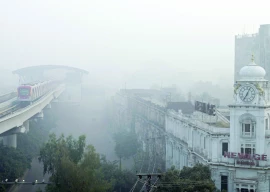
The lawmakers have opted to make free and compulsory education a basic right for children between the ages of five and 16.
In the wake of the bill’s passage, there is a strong agreement among stakeholders about the benefits of the law. However, certain reservations persist. The Express Tribune explores these in detail. The bill, introduced in 2010 with the inclusion of Article 25-A that made free and compulsory education a right for all children, had long been under discussion at the provincial level. In 2012, a commission was established to formulate a legislative framework to implement the provisions of the article. It took almost two years to pass the law.
Iftikhar Mubarak, a spokesperson for the Childs Rights Movement (CRM), believes that enacting a law that offers a framework for the implementation of the provisions given within the article is just the first step. “It is welcome news. This should have already been done,” he says. “What is important now is how we go about providing a monitoring and implementation mechanism,” he says.
The CRM represents 26 non-government organisations working for the welfare and rights of children. Mubarak says the real challenge for the government will be to bring forth an effective mechanism that would reflect the provisions and the framework of the law. “That has always been a problem in Pakistan. We have laws but then we either lack capacity or the intention to actually ensure their implementation,” he says.
The government says it is well on its way to practically implementing the provisions of the law. The government has been carrying out the universal primary enrollment drive across the province. The enrollment drive aims to enroll out of school children in the five-to-nine age group. According to Qaiser Rasheed, the School Education Department deputy secretary, the drive has managed to enroll 4.3 million children this year.
“We enrolled 3.8 million children the previous year. The retention rate has been more than 80 per cent so far. This and providing missing facilities, are attempts to ensure provision of education to all children under the provisions of the Article 25-A,” he says.
“The legislative framework will make it necessary to deliver results. It is a question about delivering a basic right now. The government has been working in that direction. However, it will become all the more important to deliver on those commitments now after the passage of the law,” he says.After the promulgation of the Punjab Free and Compulsory Education Ordinance in May this year, the Institute of Social and Policy Sciences (ISAPS) presented a list of more than 20 recommendations in various provisions within that ordinance. The report touches upon several issues including that of the role of the private schools.
Ahmad Ali, a research fellow at the ISAPS, believes that the provisions, making it binding on private schools to either enroll disadvantaged children equivalent to 10 per cent of the strength of each class or alternately to provide vouchers for disadvantaged children in other schools, shall raise several questions. “The government has failed to regulate and monitor private schools in the province so far. How does it now plan to execute a greater monitoring mechanism?” Ali asks. He says the clause can offer major hurdles in the implementation phase of the law because a majority of the private schools were low-fee. Baela Raza Jamil, the Idara-i-Taleem-o-Aagahi programmes director, finds the inclusion of pre-school and vocational education encouraging. “The government has proved itself progressive in terms of its perception of learning by expanding those goals beyond a traditional framework,” she says.
However, she asks whether the government is ready to do all that it is committing to do, especially by the year 2015. “By the next academic year, we should be ready to implement the provisions of the law,” she says. Without this, she says, there is always the danger of a law being in place without rules to carry out its objectives, as was the case with the Punjab Compulsory Primary Education Act 1994. “If Punjab leads the way, the other provinces will follow suit,” she says.
Published in The Express Tribune, October 29th, 2014.
1724760612-0/Untitled-design-(12)1724760612-0-405x300.webp)







1720030784-0/Smog-free-Lahore-(14)1720030784-0-270x192.webp)








COMMENTS
Comments are moderated and generally will be posted if they are on-topic and not abusive.
For more information, please see our Comments FAQ